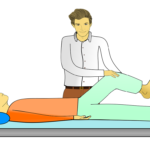As a highly experienced physical therapist with a proven track record, I, Alexander Dolsky, DPT, and my team at Dolsky Physical Therapy PC have been providing top-quality care to individuals of all ages in Forest Hills, Queens and throughout New York City for over 30 years. Our state-of-the-art facilities and welcoming environment make us the go-to destination for those seeking physical therapy. From arthritis to back pain, knee pain to shoulder pain, our licensed physical therapists and physical therapist assistants offer comprehensive treatment options tailored to each patient’s unique needs. In addition to traditional physical therapy, we also specialize in post-surgery rehabilitation, sports medicine, and balance training. Our multilingual staff ensures that we can serve our diverse patient base effectively. If you’re in need of sports medicine for hockey, football, or any other activity, we are here to help. Contact us today to schedule an appointment and discover how our expertise can benefit you.
Overview of Sports Medicine
Definition of sports medicine
Sports medicine is a specialized branch of medicine that focuses on the prevention and treatment of injuries related to sports and physical activity. It encompasses a variety of healthcare professionals, including physicians, physical therapists, athletic trainers, and sports psychologists, who work together to promote the health and well-being of athletes.
Importance of sports medicine
Sports medicine plays a crucial role in maintaining the health and performance of athletes. By providing preventive care, diagnosing and treating injuries, and facilitating rehabilitation, sports medicine professionals help athletes stay active and reach their full athletic potential. Additionally, sports medicine professionals contribute to the overall understanding of sports-related injuries and develop strategies to prevent them in the future.
Role of sports medicine in injury prevention
One of the primary focuses of sports medicine is injury prevention. Sports medicine professionals work closely with athletes and coaches to implement strategies that reduce the risk of injuries. This may involve educating athletes about proper training techniques, implementing warm-up and stretching routines, and addressing any biomechanical issues that may increase the likelihood of injury. By taking a proactive approach to injury prevention, sports medicine professionals help athletes stay on the field and avoid unnecessary setbacks.
Common Injuries in Hockey
Types of injuries common in hockey
Hockey is a physical and high-impact sport that can lead to various injuries. Some of the most common injuries in hockey include concussions, sprains and strains, fractures, and muscle contusions. Due to the fast-paced nature of the game and the physical contact involved, players are also at risk of injuries to the head, neck, and spine.
Prevention strategies for hockey injuries
Preventing injuries in hockey requires a multi-faceted approach. Players should focus on maintaining proper conditioning and strength, wearing appropriate protective gear, and following the rules and regulations of the game. Coaches and trainers can help by implementing regular rest periods, utilizing proper training techniques, and addressing any biomechanical issues that may make players more susceptible to injury.
Rehabilitation and treatment options for hockey injuries
In the unfortunate event of an injury, sports medicine professionals play a critical role in the rehabilitation and treatment process. Treatment options for hockey injuries may include physical therapy, medication, and in some cases, surgical intervention. Rehabilitation protocols are designed to help athletes regain strength, flexibility, and coordination, with the ultimate goal of returning to the game safely. Sports medicine professionals work closely with athletes throughout the recovery process, providing guidance and support.
Sports Medicine Techniques for Football
Importance of sports medicine in football
Football is a high-impact sport that exposes players to a significant risk of injuries. Sports medicine professionals play a vital role in ensuring the overall health and well-being of football players. They provide preventive care, diagnose and treat injuries, and assist in rehabilitation, allowing players to stay on the field and perform at their best.
Preventive measures for football injuries
Preventing injuries in football requires a comprehensive approach. Players should focus on proper conditioning and strength training, using appropriate protective gear, and following proper tackling and blocking techniques. Coaches and trainers can help by implementing structured training programs, monitoring player fatigue levels, and prioritizing safety during practices and games.
Diagnosis and treatment of common football injuries
In the event of an injury, sports medicine professionals employ various diagnostic techniques, such as X-rays, MRI scans, and physical examinations, to assess the extent of the injury. Treatment options for football injuries may include physical therapy, medication, or sometimes surgical intervention. Sports medicine professionals work closely with athletes to develop personalized treatment plans and guide them through the recovery process.
Sports-Specific Conditioning for Hockey
Understanding the unique demands of hockey
Hockey is a demanding sport that requires a combination of strength, speed, agility, and endurance. Understanding the specific physical demands of hockey is essential in developing an effective conditioning program. Sports medicine professionals take into account the dynamic movements, quick changes in direction, and the intense cardiovascular requirements of the sport when designing conditioning regimens for hockey players.
Physical conditioning exercises for hockey players
To enhance performance and reduce the risk of injuries in hockey, sports medicine professionals recommend a variety of physical conditioning exercises. These exercises may include strength training to build muscle power and endurance, agility drills to improve quickness and reaction time, and cardiovascular exercises to enhance aerobic capacity. Sports medicine professionals work closely with athletes to tailor conditioning programs to their specific needs and goals.
Importance of proper nutrition for hockey athletes
Proper nutrition plays a vital role in the performance and recovery of hockey athletes. Sports medicine professionals provide guidance on balanced diets that include adequate protein, carbohydrates, and healthy fats to support energy production and muscle recovery. Proper hydration is also emphasized to prevent dehydration and optimize overall athletic performance.
Sports-Specific Conditioning for Football
Key aspects of football conditioning
Football conditioning is essential for optimizing performance and reducing the risk of injuries. Sports medicine professionals focus on enhancing the strength, speed, agility, and endurance of football players. Specific aspects of football conditioning may include weight training to build power and strength, sprint drills to improve speed, agility exercises to enhance quickness, and cardiovascular workouts to improve endurance.
Strength and endurance exercises for football players
Strength and endurance are crucial attributes for football players. Sports medicine professionals prescribe a variety of exercises to develop these characteristics. These exercises may include weightlifting, plyometric training, resistance band exercises, and high-intensity interval training. By targeting both muscular and cardiovascular fitness, sports medicine professionals help football players perform at their best on the field.
Dietary recommendations for football athletes
Football athletes have unique nutritional requirements to support their intense training and physical demands. Sports medicine professionals provide dietary recommendations to ensure optimal performance and recovery. These recommendations may include consuming a balanced diet rich in carbohydrates for energy, lean proteins for muscle repair, and proper hydration for optimal hydration levels.
Injury Prevention for All Activities
Importance of injury prevention in sports
Injury prevention is a paramount concern for all athletes, regardless of the sport or activity. By focusing on injury prevention, athletes can avoid setbacks, stay on the field, and achieve their athletic goals. Sports medicine professionals emphasize the importance of proper training techniques, regular rest periods, adequate warm-up and stretching routines, and the use of protective gear.
Warm-up and stretching exercises for injury prevention
Proper warm-up and stretching routines are crucial in injury prevention. Sports medicine professionals recommend dynamic stretching exercises that target specific muscle groups and prepare the body for physical activity. These exercises increase flexibility, improve joint range of motion, and enhance muscular performance, reducing the likelihood of injuries.
Common mistakes to avoid in sports activities
In the pursuit of athletic performance, athletes and coaches may inadvertently make mistakes that increase the risk of injuries. Some common mistakes to avoid include overtraining, neglecting rest and recovery, using improper technique, and disregarding warnings signs of fatigue or pain. Understanding and mitigating these mistakes can significantly contribute to injury prevention.
Rehabilitation for Hockey Injuries
Rehabilitation process for hockey injuries
Rehabilitation is a critical component of recovering from hockey injuries. Sports medicine professionals create individualized rehabilitation programs that address the specific needs of each athlete. The rehabilitation process typically involves a combination of exercises and therapies to restore function, improve strength and flexibility, and alleviate pain. Throughout the rehabilitation journey, sports medicine professionals monitor progress and make necessary adjustments to optimize recovery.
Exercises and therapy techniques for hockey injury recovery
Recovery from hockey injuries often involves a combination of exercises and therapy techniques. Physical therapy exercises may focus on increasing strength and range of motion in the affected area, improving stability and balance, and enhancing overall functional ability. Additionally, sports medicine professionals may incorporate manual therapy techniques, such as massage and joint mobilization, to expedite healing and reduce pain.
Returning to sports after a hockey injury
The ultimate goal of rehabilitation for hockey injuries is to safely return athletes to the game. Sports medicine professionals work closely with athletes throughout the recovery process, gradually reintroducing them to sport-specific activities and monitoring their progress. Return-to-sport guidelines take into account the specific injury, the athlete’s capabilities, and the requirements of the sport, ensuring a safe and successful return to play.
Rehabilitation for Football Injuries
Rehabilitation protocol for football injuries
Rehabilitation protocols for football injuries are designed to address the unique demands of the sport and facilitate a full recovery. Sports medicine professionals create tailored rehabilitation plans that focus on regaining strength, flexibility, and functional ability. Rehabilitation may include a combination of exercises, therapies, and targeted interventions to address specific injuries, such as ankle sprains, knee ligament tears, and shoulder dislocations.
Recovery exercises and treatment modalities for football injuries
The recovery process for football injuries often involves a combination of exercises and treatment modalities. Sports medicine professionals may incorporate exercises to improve strength, stability, and range of motion. Additionally, modalities such as ultrasound, electrical stimulation, and cryotherapy may be used to reduce pain and inflammation, accelerate healing, and promote recovery.
Gradual return-to-play guidelines for football athletes
Returning to play after a football injury requires a systematic and gradual approach. Sports medicine professionals provide specific guidelines and milestones for athletes to follow during their return-to-play journey. These guidelines ensure that athletes regain their strength, endurance, and skill level incrementally, minimizing the risk of reinjury and ensuring a safe and successful return to the game.
Sports Nutrition for Optimal Performance
Importance of nutrition in sports
Nutrition plays a crucial role in optimizing athletic performance. Proper nutrition provides the necessary fuel for energy production, aids in muscle recovery and repair, enhances endurance, and supports overall health and well-being. Sports medicine professionals provide guidance on nutrition to help athletes meet their specific dietary needs and achieve optimal performance.
Nutritional requirements for hockey players
Hockey players have unique nutritional requirements due to the physical demands of the sport. Sports medicine professionals emphasize the importance of consuming a balanced diet that includes adequate carbohydrates for energy, lean proteins for muscle repair, and healthy fats for overall health. Proper hydration is also emphasized to maintain optimal performance and prevent dehydration during intense training and competition.
Nutritional guidelines for football athletes
Football athletes require specific nutritional guidelines to support their training and performance. Sports medicine professionals emphasize proper fueling strategies that incorporate the right balance of macronutrients and micronutrients. Guidelines may include consuming a combination of carbohydrates and protein for muscle recovery, adequate hydration, and appropriate timing of meals and snacks to optimize energy levels throughout training and competition.
Sports Psychology in Athletic Performance
Understanding the role of sports psychology
Sports psychology plays a vital role in enhancing athletic performance. It focuses on the mental aspects of sports, such as motivation, focus, confidence, and resilience. Sports medicine professionals work with athletes to develop mental strategies and techniques that enhance performance and optimize overall well-being.
Mental strategies for improving performance in hockey
Sports medicine professionals utilize a variety of mental strategies to improve performance in hockey. These strategies may include visualization, goal-setting, positive self-talk, and relaxation techniques. By helping athletes develop mental resilience and focus, sports medicine professionals enhance their ability to handle pressure and perform at their best on the ice.
Psychological techniques for success in football
Football athletes can benefit from various psychological techniques to enhance their performance. Sports medicine professionals may employ techniques such as imagery, cognitive restructuring, stress management, and goal-setting. By addressing mental barriers and promoting a positive mindset, sports medicine professionals help football athletes overcome challenges and achieve success on the field.
In conclusion, sports medicine plays a crucial role in the prevention, treatment, and rehabilitation of injuries in various sports. Whether it’s hockey, football, or any other activity, sports medicine professionals work tirelessly to ensure athletes can perform at their best and stay healthy. Through a combination of preventive measures, rehabilitation protocols, and specialized approaches tailored to each sport, sports medicine professionals contribute to the overall well-being and success of athletes. With their guidance, athletes can push their limits, recover from injuries, and achieve their athletic goals.




